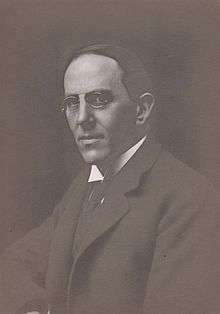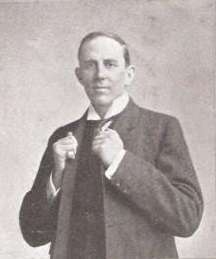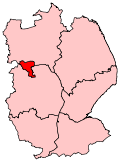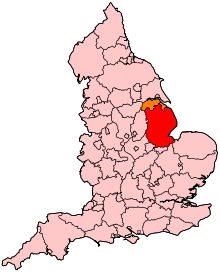Lincoln is a constituency[n 1] represented in the House of Commons of the UK Parliament since 2010 by Karl McCartney, a Conservative.[n 2]
With the splitting of the City of York constituency at the 2010 general election, Lincoln became the oldest constituency in continuous existence in the United Kingdom, having been established in 1265.
Boundaries
The constituency, as its name suggests, covers the cathedral city[n 3] of Lincoln in Lincolnshire, and most of its directly adjoining villages.
History
Lincoln first sent Members to Parliament in 1265, thirty years before the first all-over coverage of cities and qualifying towns was introduced in the Model Parliament, and has done so ever since, although no records exist from before the end of the 13th century. The early elections were held at the Guildhall and the burgesses elected were usually officials of the borough.
The representation, originally two Members ("burgesses"), was reduced to one Member in 1885.
The seat was represented for five years by the future Cabinet minister Margaret Jackson, later Margaret Beckett.[n 4] Lincoln became the oldest constituency in the country in 2010 when the City of York constituency was divided.
Constituency profile
The seat includes the University of Lincoln. From 1945 to 1972 Lincoln was continuously held by the Labour Party, often as a safe seat. The city has good transport links with Nottingham, Hull and the smaller ancient market towns in Lincolnshire, such as Spalding, Market Rasen and Boston. Lincoln has been a bellwether constituency since October 1974, having voted for the winning party in each election since that time.
Members of Parliament
MPs 1265–1660
MPs 1660–1885
| Election | Member[8] | Party | Member[8] | Party |
| 1660 |
|
John Monson |
|
|
Sir Thomas Meres |
|
| 1661 |
|
Sir Robert Bolles, Bt |
|
| 1664 |
|
Sir John Monson |
|
| 1675 |
|
Henry Monson |
|
| 1681 |
|
Sir Thomas Hussey, Bt |
|
| 1685 |
|
Henry Monson |
|
| 1689, January |
|
Sir Christopher Nevile |
|
| 1689, May |
|
Sir Edward Hussey, Bt |
|
| 1690 |
|
Sir John Bolles, Bt. |
|
| 1695 |
|
William Monson |
|
| 1698 |
|
Sir Edward Hussey, Bt |
|
| 1701, January |
|
Sir Thomas Meres |
|
| 1701, December |
|
Sir Edward Hussey, Bt |
|
| 1702 |
|
Sir Thomas Meres |
|
| 1705 |
|
Thomas Lister |
|
| 1710 |
|
Richard Grantham |
|
| 1713 |
|
John Sibthorpe |
|
| 1715 |
|
Sir John Tyrwhitt, Bt |
|
|
Richard Grantham |
|
| 1722 |
|
Sir John Monson |
|
| 1727 |
|
Charles Hall |
|
| 1728 |
|
Sir John Tyrwhitt, 5th Bt |
|
| 1734 |
|
Charles Monson |
|
|
Coningsby Sibthorpe |
|
| 1741 |
|
Sir John Tyrwhitt, 6th Bt |
|
| 1747 |
|
Coningsby Sibthorpe |
|
| 1754 |
|
George Monson |
|
|
John Chaplin |
|
| 1761 |
|
Coningsby Sibthorpe |
|
| 1768 |
|
Thomas Scrope |
|
|
Constantine John Phipps[9] |
|
| 1774 |
|
The Viscount Lumley |
|
|
Robert Vyner |
|
| 1780 |
|
Sir Thomas Clarges, Bt |
|
| 1783 |
|
John Fenton-Cawthorne[10] |
|
| 1784 |
|
Richard Lumley-Savile |
|
| 1790 |
|
The Lord Hobart[11] |
|
| 1796, 14 May |
|
George Rawdon |
|
| 1796, 25 May |
|
Richard Ellison |
|
| 1800 |
|
Humphrey Sibthorp |
|
| 1806 |
|
William Monson |
|
| 1808 |
|
The Earl of Mexborough |
|
| 1812 |
|
John Nicholas Fazakerley |
|
|
Sir Henry Sullivan |
|
| 1814 |
|
Coningsby Waldo-Sibthorpe |
|
| 1818 |
|
Ralph Bernal |
|
| 1820 |
|
Robert Percy Smith |
|
| 1822 |
|
John Williams |
|
| 1826 |
|
John Nicholas Fazakerley |
|
|
Charles Delaet Waldo Sibthorp |
|
| 1830 |
|
John Fardell |
|
| 1831 |
|
George Fieschi Heneage |
|
| 1832 |
|
Edward Lytton Bulwer[12] |
|
| 1835 |
|
Charles Delaet Waldo Sibthorp |
Conservative |
| 1841 |
|
William Rickford Collett |
|
| 1847 |
|
Charles Seely [13] |
|
| 1848 by-election |
|
Thomas Benjamin Hobhouse |
|
| 1852 |
|
George Fieschi Heneage |
|
| 1856 by-election |
|
Gervaise Tottenham Waldo Sibthorp |
Conservative |
| 1861 by-election |
|
Charles Seely |
Liberal |
| 1862 by-election |
|
John Bramley-Moore |
Conservative |
| 1865 |
|
Edward Heneage[14] |
Liberal |
| 1868 |
|
John Hinde Palmer |
Liberal |
| 1874 |
|
Edward Chaplin |
Conservative |
| 1880 |
|
John Hinde Palmer |
Liberal |
| 1884 by-election |
|
Joseph Ruston |
Liberal |
MPs 1885–present
Elections
Elections in the 2010s
Elections in the 2000s
Elections in the 1990s
Elections in the 1980s
Elections in the 1970s
Elections in the 1960s
Elections in the 1950s
Election in the 1940s
General Election 1939/40
Another General Election was required to take place before the end of 1940. The political parties had been making preparations for an election to take place from 1939 and by the end of this year, the following candidates had been selected;
Elections in the 1930s
Elections in the 1920s
Elections in the 1910s

Roberts
*endorsed by Coalition Government
General Election 1914/15
Another General Election was required to take place before the end of 1915. The political parties had been making preparations for an election to take place and by the July 1914, the following candidates had been selected;

Roberts
Elections in the 1900s
See also
Notes
References
- ↑ "Electorate Figures - Boundary Commission for England". 2011 Electorate Figures. Boundary Commission for England. 4 March 2011. Retrieved 13 March 2011.
- 1 2 Members of Parliament 1213-1702. London: House of Commons. 1878.
- ↑ "SALTBY, Robert, of Lincoln.". History of Parliament. Retrieved 2014-07-30.
- 1 2 3 4 5 6 7 8 9 10 11 12 13 14 15 16 17 18 19 20 21 22 23 24 25 26 "History of Parliament". Retrieved 2011-09-19.
- ↑ "Fitzwilliam, Sir Thomas, Speaker of the House of Commons". Oxford DNB. Retrieved 2011-12-01.
- 1 2 3 4 5 6 7 8 9 10 11 12 13 14 "History of Parliament". Retrieved 2011-09-19.
- 1 2 3 4 5 6 7 8 9 10 "History of Parliament". Retrieved 2011-09-19.
- 1 2 3 Leigh Rayment's Historical List of MPs – Constituencies beginning with "L" (part 3)
- ↑ Constantine Phipps later succeeded to the peerage as the 2nd Baron Mulgrave
- ↑ John Fenton-Cawthorne was expelled from the House of Commons on 2 May 1796
- ↑ Robert Hobart was known as Robert Hobart until 1793, and as Lord Hobart from 1793 until he acceded to the peerage in 1804 as the 4th Earl of Buckinghamshire
- ↑ Edward Lytton Bulwer was known as Bulwer-Lytton from 1844, and in 1866 became the 1st Baron Lytton
- ↑ The election in 1847 of Charles Seely was declared void on 10 March 1848
- ↑ Edward Heneage was later enobled as Baron Heneage
- ↑ "Election Data 2015". Electoral Calculus. Archived from the original on 17 October 2015. Retrieved 17 October 2015.
- ↑ "Lincoln parliamentary constituency". BBC News. Retrieved 8 May 2015.
- ↑ "Election Data 2010". Electoral Calculus. Archived from the original on 17 October 2015. Retrieved 17 October 2015.
- ↑ "Election Data 2005". Electoral Calculus. Archived from the original on 15 October 2011. Retrieved 18 October 2015.
- ↑ "Election Data 2001". Electoral Calculus. Archived from the original on 15 October 2011. Retrieved 18 October 2015.
- ↑ "Election Data 1997". Electoral Calculus. Archived from the original on 15 October 2011. Retrieved 18 October 2015.
- ↑ "Election Data 1992". Electoral Calculus. Archived from the original on 15 October 2011. Retrieved 18 October 2015.
- ↑ "Politics Resources". Election 1992. Politics Resources. 9 April 1992. Retrieved 2010-12-06.
- ↑ "Election Data 1987". Electoral Calculus. Archived from the original on 15 October 2011. Retrieved 18 October 2015.
- ↑ "Election Data 1983". Electoral Calculus. Archived from the original on 15 October 2011. Retrieved 18 October 2015.
- ↑ British Parliamentary Election Results 1918-1949, FWS Craig
- ↑ British Parliamentary Election Results 1918-1949, FWS Craig
- ↑ British Parliamentary Election Results 1918-1949, FWS Craig
- ↑ British Parliamentary Election Results 1918-1949, FWS Craig
- ↑ British Parliamentary Election Results 1918-1949, FWS Craig
- ↑ British Parliamentary Election Results 1918-1949, FWS Craig
- ↑ British Parliamentary Election Results 1918-1949, FWS Craig
- ↑ British Parliamentary Election Results 1918-1949, FWS Craig
- 1 2 3 4 British parliamentary election results, 1885-1918 (Craig)
Sources
- Guardian Unlimited Politics (Election results from 1992 to the present)
- http://www.psr.keele.ac.uk/ (Election results from 1951 to the present)
- Craig, F. W. S. (1989) [1977]. British parliamentary election results 1832–1885 (2nd ed.). Chichester: Parliamentary Research Services. p. 187. ISBN 0-900178-26-4.
- Craig, F. W. S. (1989) [1974]. British parliamentary election results 1885–1918 (2nd ed.). Chichester: Parliamentary Research Services. p. 137. ISBN 0-900178-27-2.
- Craig, F. W. S. (1983) [1969]. British parliamentary election results 1918–1949 (3rd ed.). Chichester: Parliamentary Research Services. p. 172. ISBN 0-900178-06-X.
Coordinates: 53°14′N 0°32′W / 53.23°N 0.54°W / 53.23; -0.54



